MANCHESTER
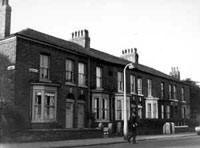 As well
as I can recollect, my first memory is being held in my mothers arms & asking to
watch the lights ... just before being taken into the air raid shelter as the
guns were going off & the searchlights stabbed the skies! It may
have been December 1940 (I would be about two years, three months) when the
Germans were bombing Manchester. The worst bombing occurred on the
22nd and 23rd
when 700 people were killed and 2,500 injured. Bombs landed round the area of
Chorlton, Moss Side &
Whalley Range. In fact, so close to Greame Street, that when my parents moved half a mile away to their
second house in about 1959, the house had been bomb damaged originally.
As well
as I can recollect, my first memory is being held in my mothers arms & asking to
watch the lights ... just before being taken into the air raid shelter as the
guns were going off & the searchlights stabbed the skies! It may
have been December 1940 (I would be about two years, three months) when the
Germans were bombing Manchester. The worst bombing occurred on the
22nd and 23rd
when 700 people were killed and 2,500 injured. Bombs landed round the area of
Chorlton, Moss Side &
Whalley Range. In fact, so close to Greame Street, that when my parents moved half a mile away to their
second house in about 1959, the house had been bomb damaged originally. 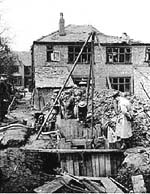 It
still stands today, whist their first house was demolished during the "slum
clearance”. In 1941 there were two other raids mentioned in his diary, the 11th
of March for three hours and on 1st. June, when we were visiting
Whalley, there was another blitz in Manchester. The war ended when I was six and
a half. Never during that period did I know of, comprehend or
realise we were in mortal danger. My parents hid the fact of death, bombings or
family losses from me. The nearest I got to a upsetting war memory was the
telegram she received, when visiting Harrogate to see dad, to say Uncle Ken had been injured and I can remember mum saying it was
alright, it was just an injury. Her other brother Bill had died in 1942.
It
still stands today, whist their first house was demolished during the "slum
clearance”. In 1941 there were two other raids mentioned in his diary, the 11th
of March for three hours and on 1st. June, when we were visiting
Whalley, there was another blitz in Manchester. The war ended when I was six and
a half. Never during that period did I know of, comprehend or
realise we were in mortal danger. My parents hid the fact of death, bombings or
family losses from me. The nearest I got to a upsetting war memory was the
telegram she received, when visiting Harrogate to see dad, to say Uncle Ken had been injured and I can remember mum saying it was
alright, it was just an injury. Her other brother Bill had died in 1942.
If you watch the film “A taste of honey”, the heroine rides around Manchester & Salford city centres. Although the film was in black & white, you get a sense of how filthy the city really was. It was black with soot from all those smoking chimneys & the industrial revolution. After it's battering from the bombing in the war, Manchester was a truly dirty place. The song "Dirty Old Town" was written by a Ewan McColl (whose real name Jimmy Miller) & summed up Manchester & Salford to a tee! Often Mum was upset by the large flakes of soot that fell on Mondays washing hung out there on the long line, from the house wall to the back garden wall. (Garden! A narrow strip of thin soil down the dividing walls of the terraced houses that was really a yard.) “Pea souper fogs” were a regular occurrence. So thick you couldn't see from the edge of the pavement to the middle of the road. Conductors had to walk in front of buses to get them back to the depot. Blow your nose & the handkerchief was black! (No tissues in the 1940s). It was as a result of this that the clean air act brought in smokeless coal in 1956.
The house at No. 9 Greame St. was huge. It was in a terrace of six houses. It had a cellar with two rooms and was three stories high, having an attic in the roof. You came through the front door into a long hall with, on the left, the parlour or front room. There was a dark middle room, the light coming from a window that looked onto the thin narrow part of the back yard. You went past the door under the stairs that led to the cellar & stepped down into the kitchen. This was where our family life happened. In here was the fireplace, the radio (that was never off)
on a set of draws and the kitchen table between the two
sash windows. The muck, dust & ash that fire made, may have been normal but it
sure could produce a draft under the doors. It was common to knit & stuff a
draft excluder on the door bottoms. Off to the left lead into the scullery. This
was the cooking & washing area, thin, long & cramped. The tiny scullery had
stone slabs by the sink, a gas cooker and thinking about it now, it was probably
an extension that held above it the bathroom. The back door was the way into the
“garden” back yard & the air raid shelter. I wonder when the shelter was built?
Probably just before we moved in.
off)
on a set of draws and the kitchen table between the two
sash windows. The muck, dust & ash that fire made, may have been normal but it
sure could produce a draft under the doors. It was common to knit & stuff a
draft excluder on the door bottoms. Off to the left lead into the scullery. This
was the cooking & washing area, thin, long & cramped. The tiny scullery had
stone slabs by the sink, a gas cooker and thinking about it now, it was probably
an extension that held above it the bathroom. The back door was the way into the
“garden” back yard & the air raid shelter. I wonder when the shelter was built?
Probably just before we moved in.
The woodwork was painted dark brown throughout the house, linoleum & carpet squares covered
everywhere. Originally the house had had servant's, the bells to call them
were still there. There were fireplaces in all rooms. Of course, house central heating
was unknown to anyone. The coal was delivered on a horse & cart originally &
thrown down the "coal 'ole" in front of the house & stored in the cellar. As
well as the dirty wet coal, the cellars were dark, dank and unused. It had two rooms below street
level. I told my Mum a joke once about every time the lady of the house wanted coal,
she would say, "Alexandra.... the grate!" She never stopped using it with me. It
was one of t he regular jobs, going down the cellar, using an old axe to break up
the large bits of coal and fill the bucket,
which was kept by the side of the fireplace. For me it was always a game,
spending too long a time busting up coal or trying to get it over with quickly,
when it was freezing cold & wet through. Down there was still a washing boiler in
one corner, heated by a fire underneath it. I never remember Mum using it but I
do have a faint recall of a great mangle (it was a device to get water out of
clothes). I don’t think this was used much either. I remember a boy at school had lost a
finger in one of these contraptions.
he regular jobs, going down the cellar, using an old axe to break up
the large bits of coal and fill the bucket,
which was kept by the side of the fireplace. For me it was always a game,
spending too long a time busting up coal or trying to get it over with quickly,
when it was freezing cold & wet through. Down there was still a washing boiler in
one corner, heated by a fire underneath it. I never remember Mum using it but I
do have a faint recall of a great mangle (it was a device to get water out of
clothes). I don’t think this was used much either. I remember a boy at school had lost a
finger in one of these contraptions.
The front room was used on high days & holidays; it was the Sunday best room. There had to be a special reason to use it. In the bookcase by the fireside was Arthur Mee’s Children’s Encyclopaedia. I’m sure most of my diverse knowledge came from these books. Articles in alphabetical order, ants where followed by astronomy. Oceans by orchids. Dyslexia wasn’t known then but I’m sure I had it; I read so much but hadn’t a clue on spelling all my life. I read a lot; day dreamed a lot & still made “careless mistakes” according to school.
In this room was a huge three-piece suit in dark brown that was probably leather. There were wooden shutters that could be pulled out to fill the bay’s sash windows. I can remember Dad changing the broken cord on one of the weights. They reminded me of the clock weights on granddad’s small Grandfather clock. Thin & heavy, the sash weight was dark grey, probably made of lead. It would need some weight to counter balance those large windows.
Of course
the house had no double-glazing, no central heating, no fitted carpets, no
fridges. Roofs were not insulated & cavity wall insulation was just a twinkle in
someone's eye! In fact when I got married in 1963, my Dad wanted to know why I needed
a fridge! He died without his house in Whalley Range having double-glazing and no real central
heating. Up to the last months, he was still making a fire and emptying ashes!
(And getting drafts!) 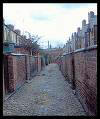
Mum & Dad always had the front bedroom. At various times I change rooms; first my room was the back one. People had to past through there, on the way to the bathroom. I also had the middle bedroom. I suspect I was moved so that “Uncle” Jimmy Jackson, a Ribble bus driver, could use it. In this bedroom was an enormous map that my dad had got from work. It was a gazetteer of Gt. Britain. I remembered using that map for years. Later, when my sister was born & needed the middle bedroom, it was my last move. I had the attic at the top of the house. The view was just like the opening of Coronation St. as it overlooked the back entry!
One of the regular games was "mountaineering" up the outside of the banisters. As you could see right to the floor through the tight gap, it looked so high & dangerous. Lots of twists & turns as I negotiated the different landings. I think our house must have been a little more lax whilst I was inside. I think it was the outside world bothered mum! "Come straight home & don't talk to any strange men" was her chant whenever I left for school. We could read books without asking permission, whereas Billy, my best mate from next door, had to ask permission to get out his YnWot book! (It sounded like one word, it was actually a book with questions & answers called "Your Why & What book") He was threatened with never being able to use his Meccano if so much as a nut went missing. Maybe Bill learnt the value of things more than me!
All these memories are clear & vague, accurate & wrong all at the same time. I am not sure which happened when.I have a vivid recollection of glass being broken at the back door. My mum saying "Be careful of that glass" & of course I fell & cut open the palm of my hand (the scar is still visible now). There was a discussion of getting stitches at the doctors. I have no idea if it was preschool, but I was very young.
 I
had a day in sunny Blackpool, digging holes in the sand. That got me very badly
sun burnt. I can remember the pain on the bus home; the doctor calling & what
seemed like gallons of calamine location. No factor 25s in those days. Not a lot
of sense either, I suspect!
I
had a day in sunny Blackpool, digging holes in the sand. That got me very badly
sun burnt. I can remember the pain on the bus home; the doctor calling & what
seemed like gallons of calamine location. No factor 25s in those days. Not a lot
of sense either, I suspect!
During the war, next-door neighbours would come together in the air raid shelter, we seemed close to the Mottrams at number 11. After the war, we didn’t seem to live in each other’s pockets anymore. Was this closeness because Florence was on her own a lot as Arthur was in Harrogate? Was it the fear of the bombing they huddled together? The famous English spirit of the blitz? Who knows?
I can remember measles but I’m sure I was of school age. Kept in the dark in my bedroom for the fear it affected my eyesight. I think measles was pretty serious then. The complications are dangerous. 6% to 20% of the people who get the disease will get an ear infection, diarrhoea, or even pneumonia. One out of 1000 people with measles will develop inflammation of the brain, and about one out of 1000 will die. In some cases, measles can lead to other health problems, such as croup, and infections like bronchitis, bronchiolitis, pneumonia, conjunctivitis (pinkeye), myocarditis, and encephalitis. Measles also can make the body more susceptible to ear infections or other health problems caused by bacteria.
First day at school? I cried my eyes out! I got a peg with a picture of a yacht to hang my coat on. We had a sleep in the afternoons and drank milk. In the winter, it used to be warmed on the radiators ... it tasted foul! I entered in one door of St. Margaret’s Elementary school at five & left through another at fifteen with no qualifications at all.
Talking
of foul ... Fennings Fever Curer! My God, that was awful! It was like the use of
iodine; it only did you good if it tasted like poison or hurt like hell! Another
great one, was hydrogen peroxide poured in the ears to get rid of wax. It used
to fizz that much, it bordered on pain. It was another way to raise pandemonium
in the household, trying to get me to lie still while Mum poured it in. And yes,
I am a little deaf & have very loud tinnitus now. Did it turn my eardrums to leather?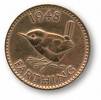
It must have been very early on, when the bus fares were in stages, that Dad would walk on to the next stage to save a farthing. (One quarter of one old penny, there were 12 pennies to a shilling and 20 shillings to the pound ... that’s 960 farthings to the pound!) They must have been very short of money at times.
I remember sweet rationing vividly! My Mum & I used to scoff the lot in minutes! I know that rationing was ended in February 1953, (I’d be 14, in my last year at school); I swear I can remember them going off ration once & then going back on again. It took ages to find the reference:The government and manufacturers have been quick to reassure the public that there would be no repeat of the first attempt to de-ration sweets, in April 1949, (I was ten) when demand far outstripped supply and they were put back on ration after just four months. This time, the Minister of Food, Major Gwilym Lloyd-George, has told the House of Commons that he has no doubt that stocks are sufficient. He has ordered a one-off allocation of extra sugar to manufacturers to help them meet the anticipated surge in demand.
I still remember the shop opposite school having no stock very soon after sweets came off ration. My Mum & I had a very sweet tooth. I seem to remember Billy Mottrams made his ration last longer than I ever did!
To see the small amount of food a mother struggled to feed her family with, no wonder the cry was “Don’t you know, there's a war on?” Rationing came into force on 8 January 1940, a few months after the start of World War II. All sorts of essential and non-essential foods were rationed, as well as clothing, furniture and petrol. Rationing of sweets and chocolate began on 26 July 1942. The process of de-rationing began in 1948, but made slow progress until 1953. Then Food Minister Gwilym Lloyd-George made it a priority for his department. As well as sweets, he took eggs, cream, butter, cheese, margarine and cooking fats off the ration books. He de-rationed sugar in September 1953, partly as a result of pressure from sweet manufacturers, and finally ended rationing when meat was taken off the ration books in July 1954. The de-rationing of sweets had a dramatic effect on the confectionery market. Spending on sweets and chocolate jumped by about £100m in the first year to £250m - a year which, according to the confectionery industry, was "as dynamic as any in the industry's history". Consumers in the UK now spend in excess of £5.5bn on confectionery each year
Food
Rationing in WW2.
The average standard rations during the war years. (per person per week unless stated)
1s 2d (just under 6p) (approximately 1 lb 3 oz or 540 g) of meat (offal or sausages weren't rationed). Although sausages were not on ration, it is important to say that the meat that was needed to make them was so scarce that they were very rarely seen. Meat needed to be saved to send to soldiers in the war.)
4 oz (113 g) bacon or ham
3 pints (1.7 litres) of milk per week or 1 packet of milk powder per month
2 oz (57 g) butter
2 oz (57 g) margarine
2 oz (57 g) fat or lard
2 oz (57 g) loose tea (tea bags were never used widely in the UK)
1 egg per week or 1 packet of egg powder per month (one packet makes 12 “eggs”)
2 oz (57 g) jam
3 oz (85 g) sugar
1 oz (28 g) cheese
3 oz (85 g) sweets (about a good mouthful!)
2 lb (907g) onions (onions were only rationed between 1942-1944)
Plus 16 "points" per month for tinned and dried food.
We also
got free, Vitriol (Malt on a spoon!) & concentrated orange juice.
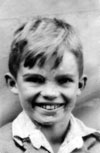 That
leads me to think of the lame excuses Dad’s had for not buying things, in the
days of these desperate shortages, was wonderful to hear. “Children should be
seen & not heard”? It would have been easier to say, "We are short of money!"
That
leads me to think of the lame excuses Dad’s had for not buying things, in the
days of these desperate shortages, was wonderful to hear. “Children should be
seen & not heard”? It would have been easier to say, "We are short of money!"
“Would you buy a Rolls Royce, Dad?” “No they are too quiet, I might run over someone”
“Can I have an American shirt?” (Explanation: An American shirt unbuttoned all the way down, as they do today, an English shirt, you had to pull over your head.) “No, they will make you lazy!”
“I don’t like boiled cabbage” “You ungrateful child, the Chinese are starving to death!”
It was not a good idea, at this point, to say “lets send them this then!” Blinding your Dad with logic only got you a clip around the ear! Dad claimed he never smacked me, because he did once & found out later it wasn't my fault. This didn't stop him leaving it to mum! A smack around the legs was favourite & occasional a tap on the head with her ring was very painful!
It was too much, as a child, to understand the pressures of wartime. There were shortages of everything and lack of money to buy them, even if they had been available. Parents were confronted with problems such as, keeping up with the mythical Joneses, one parent away for long periods, news of deaths at war, was it going to be your turn next with the bombing? Add to that, was your child getting all the stuff it needed with the rationing? It was common to see mum’s to give up their share so the child got more. As it wasn’t up for discussion with children, we appreciated nothing. We were protected from real life. What child would understand War?
 I was 6
at the end of World War Two. Apart from the dreadful losses of the armed forces
& civilians on all sides of the war. Hitler & his cohorts had managed to murder about 7,000,000
people in the death camps like Treblinka, Auschwitz & Bergen-Belsen, just for
being Jewish, Gypsy, homosexual or he just didn't like your style. I was protected from these things. I have a vague memory of a foreign worker (maybe
Polish) who was connected with Peter Dixons's shop. He once showed us pictures
of dead bodies & we only noticed they were naked! (unknown then)
I was 6
at the end of World War Two. Apart from the dreadful losses of the armed forces
& civilians on all sides of the war. Hitler & his cohorts had managed to murder about 7,000,000
people in the death camps like Treblinka, Auschwitz & Bergen-Belsen, just for
being Jewish, Gypsy, homosexual or he just didn't like your style. I was protected from these things. I have a vague memory of a foreign worker (maybe
Polish) who was connected with Peter Dixons's shop. He once showed us pictures
of dead bodies & we only noticed they were naked! (unknown then)  Maybe he was
trying to give us an insight of what he'd escaped from. All I recollect is a
black & white image, like a blurred still picture. At least he tried to
inform us in an era
when children were seen but not heard. I had started at school in September 1944. I
vaguely remember the gun flashes, crossing Manchester after blitz damage but
most of it, I have no recollection of what was really happening around me. At
that age, I didn't know a thing.
Maybe he was
trying to give us an insight of what he'd escaped from. All I recollect is a
black & white image, like a blurred still picture. At least he tried to
inform us in an era
when children were seen but not heard. I had started at school in September 1944. I
vaguely remember the gun flashes, crossing Manchester after blitz damage but
most of it, I have no recollection of what was really happening around me. At
that age, I didn't know a thing.
Going with my Dad to the
centre of Manchester immediately after the war to see the “lights go on” after the
blackout was lifted, was meant to be a treat. What a massive disappointment that
was. I guess they didn’t realize, I knew nothing about blackouts, I thought
everything
was normal. It must have been a wonderful release for the adults, as the war ended,
to see the freedom to shine a light after all those years of blackout & fear
that a light may guide an enemy bomber to your very home.
To me, a light was a bulb in a socket! Being fair to me, they might have built it up a bit
too much too!
 These
were the days of policemen with truncheons & whistles. There were no two way
radios or cops cars. He had a note book with an indelible pencil (so his notes
couldn't be erased), his watch and big boots for walking in. On some old
films, you see a policeman putting his pencil on his tongue. Unless you were of
that era, you don't realise, that to make an indelible pencil work, it had to be
wet on the end of your tongue. I have seen a police sergeant stand on the street corner and hit his stick
on the pavement. This was to call the Bobby on the Beat (the local policeman) to
come to him, they walked the street then. Policemen were often seen at major
junctions on "Point duty", this way where they stood in the middle of the road &
directed traffic. There were common bits of advice at school from the teachers
if you had the excuse "I didn't know the time Sir". "If you want to know the
time ask a policeman!" they'd say. Why? Because there were always police wandering around
and
they had a watch issued so they could time incidents in their note books. That's
why the advice in those days was, if in trouble, go to a policeman. He was
always around (unless you really needed one!) he'll look after you.
These
were the days of policemen with truncheons & whistles. There were no two way
radios or cops cars. He had a note book with an indelible pencil (so his notes
couldn't be erased), his watch and big boots for walking in. On some old
films, you see a policeman putting his pencil on his tongue. Unless you were of
that era, you don't realise, that to make an indelible pencil work, it had to be
wet on the end of your tongue. I have seen a police sergeant stand on the street corner and hit his stick
on the pavement. This was to call the Bobby on the Beat (the local policeman) to
come to him, they walked the street then. Policemen were often seen at major
junctions on "Point duty", this way where they stood in the middle of the road &
directed traffic. There were common bits of advice at school from the teachers
if you had the excuse "I didn't know the time Sir". "If you want to know the
time ask a policeman!" they'd say. Why? Because there were always police wandering around
and
they had a watch issued so they could time incidents in their note books. That's
why the advice in those days was, if in trouble, go to a policeman. He was
always around (unless you really needed one!) he'll look after you.

It was a time of unbelievable shortages after the war. There was no spare money knocking about. You could buy cheap broken biscuits and bags of crushed Smiths crisps (they had little blue bags of salt in them, no pre-salted nor any kind of favoured crisps then). The joke at school was to go in the shop & ask if they had any broken biscuits. If the answer was yes, then you shouted, "Shouldn't be so careless!" and run out quick. It may sound old & corny now, but we nearly wet ourselves laughing then! Nothing was thrown away, damaged goods or not. I have no idea why I remember, but there wasn't a mum I knew that didn't have a tin box full of buttons. I vaguely recall that no matter how hard mum looked, there was never the button she needed anyway. "Make do & mend" was the order of the day. It wasn't recycling or helping the environment, it was just necessary!
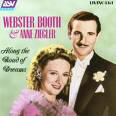 The
first piece of music that I remember that made me happy was probably "Sky liner"
& all the music I heard was from the radio. There were really only three
programs, the "Home" (mainly talk), the "Light" (mainly music) & the "Third"
(Classical). This was the time of Ann Ziegler & Webster Booth, Henry Hall &
Workers Playtime.
The
first piece of music that I remember that made me happy was probably "Sky liner"
& all the music I heard was from the radio. There were really only three
programs, the "Home" (mainly talk), the "Light" (mainly music) & the "Third"
(Classical). This was the time of Ann Ziegler & Webster Booth, Henry Hall &
Workers Playtime.

After the American's had joined the war in 1941, there was Glen Miller & Benny Goodman plus all those crooners led by Bing Crosby. Frank Sinatra was a teenage rave, charming the "Bobby Soxers" era.
From 1946 onwards "Dick Barton - Special agent" gripped the entire nation at 6.45 every night on the radio. I was glued to the old valve set, in my pyjamas & dressing gown, often with a cup of Oxo in my hand. God, life was exciting! I can still hear him crying “Come on Jock, come on Snowy” and that one and only car crash sound effect the BBC used constantly.
Very early on, the road menders used to bring a wooden caravan & the night watchman stayed all night guarding the stuff & equipment. I guess, in those days, it was normal or the poor nicked anything they could lay their hands on. The tar got sticky & bubbled up on hot summer days & we couldn’t resist playing with it. Mum must have had to work hard to get those stains out!
The first visits to the cinema were obviously with Mum. So earliest memory was "The Firefly", where the hero sang "The Donkey Serenade". It starred Nelson Eddie & Jeanette MacDonald. To see the screen, I had to sit on top of the seat whilst it was tipped up.
 A
legend in the family came from seeing the film "Let George do it" with George
Formby. It is said that when I saw George on the screen, I shouted, "That's my
Daddy". I cried when George got stuck in the barrel of a gun. (Don’t ask!). This
man was so famous in his day! His films, always centred on this gormless
character that always won the women in the end. His female, northern,
counterpart was Gracie Fields. She made fewer films but her unique voice was so
recognizable. Neither could have been called even vaguely good-looking, but in
those days it was all based on entertainment. You only had to make the people
happy with your talent!
A
legend in the family came from seeing the film "Let George do it" with George
Formby. It is said that when I saw George on the screen, I shouted, "That's my
Daddy". I cried when George got stuck in the barrel of a gun. (Don’t ask!). This
man was so famous in his day! His films, always centred on this gormless
character that always won the women in the end. His female, northern,
counterpart was Gracie Fields. She made fewer films but her unique voice was so
recognizable. Neither could have been called even vaguely good-looking, but in
those days it was all based on entertainment. You only had to make the people
happy with your talent!
 It
was a time when cinemas ran continuous programs. The phrase “Is this where we
came in” was common. Most cinemas showed two films, newsreel & maybe a cartoon.
Large posh, town centred cinemas, like the Odeon on Oxford Road Manchester, may have had an organist, who
rose from beneath the old orchestral pit, to play his melody of popular songs. I
can remember being really irritated by this. I had come to enter the world of
illusion, not watch a man play music that was better heard on the radio!
Visiting the “pictures” or the "Flicks” was a major leisure activity in the ‘30s
& 40’s.
At the end of the evening they always played the National Anthem and everyone
was meant to stand to attention. Well to be honest, the people on the outside seats got away
quickly while the middle seats couldn't get away fast enough, so they stood
there dutifully. It was the same kind of principal, where people stood still as a
funeral passed. Men would remove their hats and no one would dream of overtaking
a funeral. A mixture of respect, honour, manners & tradition.
It
was a time when cinemas ran continuous programs. The phrase “Is this where we
came in” was common. Most cinemas showed two films, newsreel & maybe a cartoon.
Large posh, town centred cinemas, like the Odeon on Oxford Road Manchester, may have had an organist, who
rose from beneath the old orchestral pit, to play his melody of popular songs. I
can remember being really irritated by this. I had come to enter the world of
illusion, not watch a man play music that was better heard on the radio!
Visiting the “pictures” or the "Flicks” was a major leisure activity in the ‘30s
& 40’s.
At the end of the evening they always played the National Anthem and everyone
was meant to stand to attention. Well to be honest, the people on the outside seats got away
quickly while the middle seats couldn't get away fast enough, so they stood
there dutifully. It was the same kind of principal, where people stood still as a
funeral passed. Men would remove their hats and no one would dream of overtaking
a funeral. A mixture of respect, honour, manners & tradition.
The centre of live entertainment has always been the Music Hall, which was later called the Variety Theatre. The nearest was the Hulme Hippodrome. My Mum took me to see all the major stars of the day & none was greater than my mother’s favourite, Joseph Locke, the Irish tenor. On one occasion, it was announced from the stage that Joe could not sing that night, due to illness. Suddenly, this Irish voice boomed out "Oh yes he can" & there was Joe, in a box to one side of the theatre. The audience went mad & I was so impressed that Joe had got himself off his deathbed to entertain his avid fans ... until Mum told me he was probably too drunk to stand!
A vivid memory was seeing Harry Seacombe's first act, (all it was based on, was a man shaving!) I literally fell off my seat laughing! Later on Harry teamed up with Peter Sellers, Spike Milligan & Michael Bentine to create the fabulous "Goons". Radio at it's best! This was the era of “Happydrome” & "Itma", on the radio, with Tommy Handley. Tommy Trinder, Max Wall, Arthur Askey, all radio & variety stars. Even Stan Laurel & Babe Hardy, still had another ten films left in them. I think that comedians such as Max Millar would not have been funny at all to me, at that age. His was adult humour, with innuendo that may have well been spoken in Hindu for all I knew about it. The Lancashire comedian Frank Randle was considered disgusting by my grandma. I never knew why!
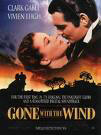 No
one really swore, it was a pastime between men in private. There was an outcry
in 1938 because Rhet Butler said, “Frankly, my dear, I don’t give a damn” in the
film
“Gone with the wind”. Because of censorship rules on swearing, the line was
nearly changed to: "Frankly my dear, I just
don't care."
No
one really swore, it was a pastime between men in private. There was an outcry
in 1938 because Rhet Butler said, “Frankly, my dear, I don’t give a damn” in the
film
“Gone with the wind”. Because of censorship rules on swearing, the line was
nearly changed to: "Frankly my dear, I just
don't care."

Too much make up, nail varnish, smoking or eating
in the street were considered vulgar. The class system was alive and well across
the whole country still. The war was breaking it down but more for women than
men. No one was politically correct at all. When the America service men were
over here, it was the first time the English, in their own country, interacted
with anyone other than white! The description of dark brown trousers or the name
of Guy Gibson’s dog was Nigger. The Methodist church, founded on the abolition
of slavery, called black people coloured, to be polite. The first waves of West Indian
immigrates began in 1948. There actually were signs on windows, advertising
rooms to let, that said, “No Irish, No Blacks, No Dogs”.
I am sure that my complete lack of colour
bias stems from the Church, the sympathy of feeling part of a minority and my
dad’s undoubted prejudice. As he lived in Rhode Island as a child, the influence of the
American Klu Klux Klan must have stuck inside his English mind. The attitude in
England was from the Empire. It was commonly believe that all “wogs” began at
Calais. If you needed a “foreigner” to understand you, you just shouted louder.
I think it was Mr. Lawley a lay preacher from church, who had a discussion with us all. I seem to remember
the blinding logic of meeting someone you liked or didn’t like. They were
friendly or hostile. Kind and generous or mean & begrudging. Having another skin
tone seemed to have very little to do with anything. That has certainly been my
experience over these 70 years.

There were American soldiers billeted round the Odeon cinema area after ’42. Lads used to run up & ask, “Got any gum, chum?” Mum considered that to be begging. I tried it one time, but felt uncomfortable.
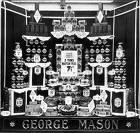 At
some time around the age of 11 or 12. I can remember something that showed I had
been protected & shielded from life too much. On the corner of Yarburgh St.
& Withington Rd., there was the grocer’s shop of George Mason’s. A large grocery
shop, similar to the co-op outlets. They were serving the more affluent
residents of Whalley Range.
At
some time around the age of 11 or 12. I can remember something that showed I had
been protected & shielded from life too much. On the corner of Yarburgh St.
& Withington Rd., there was the grocer’s shop of George Mason’s. A large grocery
shop, similar to the co-op outlets. They were serving the more affluent
residents of Whalley Range.
Whalley Range was one of Manchester's first suburbs, built by Manchester banker
and businessman Samuel Brooks as "a desirable estate for gentlemen and their
families". Brooks bought 63 acres (25 ha) of land, then called Jackson's Moss,
drained it, and built villas for wealthy businessmen such as himself. He was
born near Whalley, Lancashire, after which he named his own home Whalley House,
which may be the origin of the area's name. A toll gate guarded this exclusive
area and this place (where Chorlton Road and Withington Road meet) is still
called Brooks's Bar (pron. Brooks Bar). The charging of tolls came to an end on
June 10, 1896. This was the time when butter was cut from a large
slab with two wooden paddles. Sugar was weighed out & wrapped in brown paper.
Elderly ladies would come in, sit on a chair and the shop assistants would do
the running around. To pay for goods, the list of items was sent to the office,
with the money by a
 container on an overhead wire and later, by Lampson tube. No
one was trusted with money! The cost of putting in a long series of
tubes, under a vacuum pressure, must have been much higher than not trusting
people.
container on an overhead wire and later, by Lampson tube. No
one was trusted with money! The cost of putting in a long series of
tubes, under a vacuum pressure, must have been much higher than not trusting
people.
A friend of mine was the delivery boy there. He took boxes of shopping, ordered by the more wealthy folks, in the large basket on the shop’s delivery bike. He told me that the shop needed a boy to take the boxes to nearby houses, via a trolley. It looked like the kind of luggage trolley that was used on the railways. Two handles and metal wheels. I have no idea how long I lasted but it couldn’t have been long. The dark nights, bad weather, the darkness of the tree lined roads, the fear of being out alone, the fear of making mistakes, the deafening noises of the metal wheels & the weight of this outfit. I must have been very small and physically not up to the job. Trying to cope with the pavement edges and just waiting for the boxes fall off & see those eggs all smashed, became a nightmare! I just remember ending up at home in tears. My mum had to take me back & I quit there and then. With hindsight, I never did do any other jobs, like newspaper boy, after that. Did it put me off? Did mum tie me to her apron strings even more? Was it my religion? … I was obviously a devout coward.
 On
my ninth birthday, I woke up in the dark & there were lights on in my
parents
bedroom. I asked what was the matter. “Come & have a look” said Mum. Laying
in a cot was a sister! I had not been told about things like pregnancy. I vaguely
remember, Mum had to stay in bed but I thought she was just ill. It did not
occur to me to question that a baby should turn out of mid air. I wasn’t curious. No
one questioned it at school. We all knew, babies came via a stork or were found
under gooseberry bushes ... children were seen, but not heard! In fact, I can
remember my Aunty Doris looking at a photograph and saying that was taken when
she was expecting. I said, “Expecting what?” “A surprise!” she replied!
On
my ninth birthday, I woke up in the dark & there were lights on in my
parents
bedroom. I asked what was the matter. “Come & have a look” said Mum. Laying
in a cot was a sister! I had not been told about things like pregnancy. I vaguely
remember, Mum had to stay in bed but I thought she was just ill. It did not
occur to me to question that a baby should turn out of mid air. I wasn’t curious. No
one questioned it at school. We all knew, babies came via a stork or were found
under gooseberry bushes ... children were seen, but not heard! In fact, I can
remember my Aunty Doris looking at a photograph and saying that was taken when
she was expecting. I said, “Expecting what?” “A surprise!” she replied!
